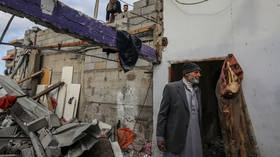‘The army needs more people’: Israel will force Ultra-Orthodox Jews to serve as patience among seculars runs out
They have no intention of serving in the IDF, and the patience of seculars is about to run out
The Ultra-Orthodox community of Israel is generally exempt from compulsory military service. Over the years, the state has tried to change this. These attempts have largely failed, in part because the country failed to pass a law that would regulate their service.
Yanki Farber, a Haredi journalist from the city of Bnei Brak, central Israel, is not a typical representative of the Ultra-Orthodox community, which currently stands at 1.25 million people, or roughly 12.5% of the population.
When he was 18, Farber enrolled into the IDF, and after his release around three years later, he has on occasion been called up to the reserves. When the events of October 7, 2023 took place – with Hamas militants launching a deadly attack on southern Israeli communities – he put on his military uniform again and went to serve.
But Farber is an exception, not the rule. Historically, Ultra-Orthodox Jews, who were a minority when the State of Israel was established in 1948, received exemptions from military service. Back then, it was agreed that they would serve the state by praying, even though some did enroll in the IDF, especially in times of war and in cities that were attacked by Arab armies.
In the 1990s, when their population started growing, Israel tried to encourage them to serve, but despite their efforts, the IDF only managed to recruit 31 individuals in 1999.
Over the years, the situation has significantly improved. In 2016, the total stood at 2,850. Recently, the military announced that it has around 6,000 Haredi soldiers in its ranks. The events of October 7 have also given the numbers a boost, though this is still just a drop in the ocean.
“The majority of the Haredis do not serve because they are afraid that in the military they will be exposed to a variety of different opinions,” Farber said.
“Over there, they are likely to encounter soldiers from the LGBT community, Druze and the Bedouins. They will serve with women – and this encounter can change their minds. This can weaken their religious beliefs, something the rabbis are worried about,” he added.
But Ronen Koehler – an Israeli colonel in the reserves and one of the key activists in Achim Laneshek (Brothers in Arms), an organization that unites reservists who fight for equality in military service – says the roots of the problem run much deeper.
“It is true that the rabbis of the Ultra-Orthodox don’t want to expose their younger generation to modernity [by sending them to the IDF – ed.]. But what’s also true is that the more students they have, the more money their yeshiva [religious school] receives. They treat it as a business, and they have no plans to loosen their grip.”
In 2021, it was estimated that Israel spent $83 million annually on its 54,000 young yeshiva students. In addition, it forked out $248 million a year on religious students with families. This budget was increased in 2023 to cater to the fast-growing population of Haredis, and experts believe these funds will continue to grow.
This excessive spending frustrates Koehler, but he is also fuming about the repercussions of this policy on Israeli society.
“They sit in the yeshiva until the age of 26 [after which they are automatically exempt from military service – ed.]. They do not study core subjects. Nor do they learn for a certain profession. So when they finish their studies, they don’t have a job. They can’t integrate into the market, they become a burden on the economy, and the whole country is paying the price.”
However, for Koehler, it is not only about money. It is also about equality and principles.
“It is unacceptable that an 18-year-old secular boy who has just finished his studies will go to the IDF, where he will spend three years of his life, whereas his religious peer will not do the same. I am not saying they [Haredis – ed.] all need to go to combat units. But they do need to serve the state, by either volunteering in hospitals, schools, by serving in cyber units, or anything else.”
Oddly enough, the Israeli government, led by Prime Minister Benjamin Netanyahu, looks at it differently.
In December 2023, two months after the outbreak of the war, the Knesset passed a law that increased the age at which exemption from military service is granted, pushing it from 40 to 41 for ordinary reservists, and from 45 to 46 for officers.
In addition, the Knesset is considering the possibility of increasing the number of days reservists are obliged to serve. Right now, Israeli reservists give the state 54 days over the course of three years. The plan is that they will now need to serve 42 days a year, or 126 in total.
“This policy contradicts any common sense,” Koehler said.
“It is clear that now [because of the war – ed.] the army needs more people – no complaints there. But instead of solving the issue by increasing the number of recruits, they burden those who already serve even more. It creates inequality and frustration because those who do enlist don’t have a life and they also face a tough attitude from their employers,” he added.
This frustration has translated into action. Last Thursday, thousands gathered in Tel Aviv to demand equal treatment regarding IDF service. Protesters urged the government to enlist Haredis and pass a law that would regulate their service.
But the government seems to be dragging its feet. For years, liberal groups have appealed to the High Court of Justice, urging it to force the government to adopt a law that would equate Haredis to seculars when it comes to military service. They also want the state to stop financing religious institutions that don’t send their students who are ineligible for an exemption to the military.
In 2017, it was finally ruled that the chapter in the security service law that dealt with the postponement of Ultra-Orthodox service should be repealed. Each year, however, the government was allowed to prolong it, until in 2023 it finally expired. The government of Netanyahu, which relies on religious parties, was given until March 31, 2024 to come up with a concrete law that would regulate the conscription of Haredis – but the prime minister asked on March 28 for an extension of 30 days to normalize the law. His attorney general has expressed a different opinion, urging the High Court to cut the funding for the yeshivas and begin the enlistment of Haredis on April 1.
For liberals, however, it might not be enough.
“They kept on postponing this law year after year. Now the time is up… if this government decides that it will abide by the law [the decision of the High Court – ed.] and passes the legislation, it will be good for everyone,” Koehler said.
“Unfortunately, this government proved time and time again that it has no problem to break the law, and ignore the ruling of the Court. If this will be the case again, anything can happen,” he added.
A number of liberal groups have warned that they will take to the streets in protest if Haredis are not called up to serve – especially now, when the IDF urgently needs 10,000 people to curb the threat of terrorism emanating from Gaza.
Liberals are also expected to demand that the money Israel spends on yeshivas and various religious institutions be significantly reduced. But Farber, who studied in the yeshiva himself, says this approach will never work.
“Applying force will not work. If such a law passes, the Haredis will leave the government, collapse the coalition, and go to sit in the opposition. Over there, they will wait for better days, when another government comes and gives them what they want. One thing is for sure, they won’t send their youngsters to the IDF.”
Koehler is aware of the sensitivities. He doesn’t believe in force either. Rather, he is sure the Haredis can be convinced that military service can benefit them in the long run.
“We need to explain to them that by serving, they end up getting more money that they can use to finance their families. After finishing the military, they have a chance to earn 35,000 NIS [roughly $9,600 – ed.] instead of working as a yeshiva teacher and get 5,000 NIS per month [$1,370 – ed.]. Rabbis will not get it but the younger generation will, and we need to talk to them.”
What happens if convincing the Haredis does not work, and the government, which needs their support to remain in power, keeps on delaying the passage of the law? Koehler promises his camp will not sit idly by.
“We are responsible people and we will not burn the state, if it comes to this. But with each day that passes, we see more and more injustice. We witness more examples of the government acting illegally, and our anger and frustration mounts. One day it might as well explode,” he warned.








Comments are closed.